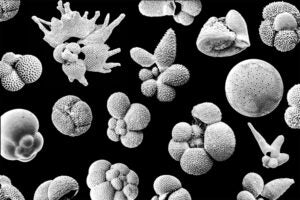Tag: Earth
-
Nation & World
‘What’s so funny ’bout peace, love, and sustainability?’
Even on Earth Day — an April celebration of the environment since 1970 — humor traditionally has had little place. There’s always more oh-oh than ho-ho.
-
Nation & World
Earth Day draws thousands
While joggers and strollers streamed merrily along sunny Memorial Drive on Saturday (April 25), Robert M. “Rob” Gogan Jr. was just a few yards away, bobbing in a kayak while combing the banks of the Charles River for litter.
-
Nation & World
Lighting the fuse for the Cambrian Explosion
Harvard paleontologists have shed new light on one of the most enduring mysteries of life on Earth: the origins of the creatures that suddenly appear in the fossil record 530 million years ago in an event known as the Cambrian Explosion.
-
Nation & World
Cyclones spurt water into the stratosphere, feeding global warming
Scientists at Harvard University have found that tropical cyclones readily inject ice far into the stratosphere, possibly feeding global warming.
-
Nation & World
Earth Week emphasizes notion of human stewardship
Earth is shielded by a film of air barely 6 miles high. About 10 million species of plants and animals, including 6 billion humans, reside within this thin skin of gases.
-
Nation & World
Riding — and reading — the Earth tide
Once a day, Miaki Ishii rides the Earth tide, rising slowly — along with her desk, chair, and entire office — 20 to 30 centimeters before sinking back again.
-
Nation & World
Researchers study glaciers on Earth’s coldest desert
It’s December, and undergraduate Jenny Middleton bundles up to face the cold. While all across campus, students, and faculty don their winter gear, Middleton is not preparing for the New England winter; she is preparing for an expedition through the Earth’s coldest desert: the McMurdo Dry Valleys in Antarctica.
-
Nation & World
Climate options must include ‘all of the above’
Climate change has so much momentum behind it that “either/or” discussions about options are meaningless because it’ll take all we can do just to arrest carbon dioxide at levels double those in preindustrial times, a top climate scientist said Dec. 11.
-
Nation & World
Humanity may hold key for next Earth evolution
Human degradation of the environment has the potential to stall an ongoing process of planetary evolution, and even rewind the evolutionary clock to leave the planet habitable only by the bacteria that dominated billions of years of Earth’s history, Harvard geochemist Charles Langmuir said Thursday (Nov. 13).
-
Nation & World
NYU chemist Robert Shapiro decries RNA-first possibility
Back in the depths of time, an event almost miraculously improbable happened, creating a long, unlikely molecule. And life arose on Earth. Or, if you prefer, back in the depths of time, in a soup of small, relatively common molecules, an unknown chemical reaction occurred, sustained itself, replicated … and life arose on Earth.
-
Nation & World
Arctic ice is thinning steadily
There was a polar bear sighting at Harvard last week. At Pforzheimer House on Thursday (Oct. 2), global warming expert James J. McCarthy delivered a crisp summary of how fast ice is melting in the Arctic — and why we should care. The audience of 80 took in his companion slide show, including images of…
-
Nation & World
And quiet flows the Don at Pusey
The Harvard Map Collection presents its fall exhibition, “From the Amazon to the Volga: The Cartographic Representation of Rivers,” which opened Wednesday (Sept. 24). For centuries, cartographers have wrestled with the difficulties of depicting rivers, and in the process they have devised many ingenious ways of answering the challenge — from streambed profiles to bird’s-eye…
-
Nation & World
Harvard Forest: 3,500 acres, global impact
Harvard may be rooted in Cambridge, but it has a lot more roots in the small north-central Massachusetts town of Petersham. That’s where you’ll find the woods, streams, and fields of the Harvard Forest, a 3,500-acre research and teaching facility that’s been part of the University for more than a century. Having been closely monitored…
-
Nation & World
Mars’ water appears to have been too salty to support life
A new analysis of the Martian rock that gave hints of water on the Red Planet — and, therefore, optimism about the prospect of life — now suggests the water was more likely a thick brine, far too salty to support life as we know it. The finding, by scientists at Harvard University and Stony…
-
Nation & World
Animal interaction behind ‘Cambrian Explosion’?
Harvard Professor of Biology and of Geology Charles Marshall presented his Tuesday (April 29), suggesting that it was an increase in interactions between species, such as predation, that drove an escalating evolutionary process that led to the development of teeth and claws and the wide variety of characteristics that we see among Earth’s animals today.
-
Nation & World
An ocean of bad tidings
Jeremy B.C. Jackson earned his first chops as a scholar by studying the ecological impacts of an event that unfolded over the last 15 million years: the formation of the Isthmus of Panama, dividing the Atlantic and Pacific oceans and setting off profound evolutionary oceanic and terrestrial changes.
-
Nation & World
Interdisciplinary conference takes micro, macro look at origins of life
How did we get here? That’s not the first line in a hangover joke. It’s a question that has been asked for centuries about the origins of life on Earth. At Harvard last week, an A-list of astronomers, physicists, Earth scientists, and chemists met in the Radcliffe Gymnasium to look at this and other fundamental…
-
Nation & World
Lava provides window on early Earth
Researchers at Harvard and the University of Hawaii believe they’ve resolved a long-standing controversy over the roots of islands — volcanoes in the middle of tectonic plates — showing that the islands’ lava provides a window into the early Earth’s makeup.
-
Nation & World
Harvard brings the Earth to high school
Steam vents in Yellowstone National Park are part of the area’s unique environment, seen in a case study exploring Yellowstone and the reintroduction of wolves into the park. This case study is part of a new environmental science course for high school science teachers.
-
Nation & World
CfA reveals Magellanic Clouds are first-time visitors
The Large Magellanic Cloud (LMC) and Small Magellanic Cloud (SMC) are two of the Milky Way’s closest neighboring galaxies. A stunning sight in the southern hemisphere, they were named after the Portuguese explorer Ferdinand Magellan, who explored those waters in the 16th century. For hundreds of years, these galaxies were considered satellites of the Milky…
-
Nation & World
Can science, religion coexist in peace?
Almost 14 billion years after the big bang, and 3.5 billion years since the first bacteria appeared on Earth, humans occupy just one branch of the tree of life. We share an evolutionary limb with other eukaryotes, creatures whose membrane-bound cells carry genetic material. Our biological neighbors developed over time just as we did, by…
-
Nation & World
Visualization Lab provides data in three dimensions
On the second floor of the Peabody Museum, in a darkened room painted flat black, Harvard geologist John Shaw slips on a pair of futuristic goggles as he sits before a 23-foot-wide wrap-around screen.
-
Nation & World
Deep-sea sediments could safely store man-made carbon dioxide
An innovative solution for the man-made carbon dioxide fouling our skies could rest far beneath the surface of the ocean, say scientists at Harvard University. They’ve found that deep-sea sediments could provide a virtually unlimited and permanent reservoir for this gas that has been a primary driver of global climate change in recent decades, and…


